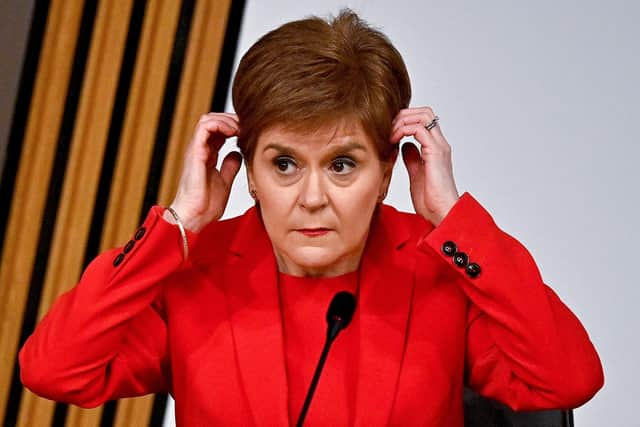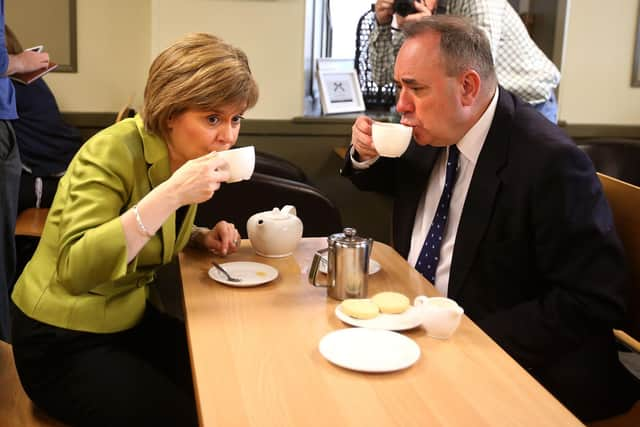Poll suggests No vote lead as Salmond inquiry drives voters away from Scottish independence
The survey is the first to take place after both Nicola Sturgeon and Alex Salmond gave their evidence to the Holyrood inquiry into the botched handling of harassment complaints against the former first minister.
The polling conducted by Savanta ComRes for The Scotsman interviewed 1,015 Scots between March 4 and 5 – the two days immediately after the First Minister’s appearance before the Salmond inquiry.
Advertisement
Hide AdAdvertisement
Hide AdThe survey does show a general preference for a No vote in any second referendum, with a total of 46 per cent support for No, 43 per cent support for Yes and 10 per cent for don't know.


With don’t knows excluded, it suggests a 52 per cent lead for No, with 48 per cent for Yes.
However, these figures are not weighted for voter turnout, with further polling expected this week to show a clearer impact of the inquiry on Scottish independence voting intention.
These figures on Scottish independence are not directly comparable with previous polls on the subject, due to this and the nature of the poll.
The poll also shows the scandal is cutting through with voters and is driving mistrust in the SNP and Ms Sturgeon, with almost half saying they trust the First Minister less due to the inquiry.


Respondents were asked to say whether certain issues were making them more or less likely to vote for Scottish independence, with choices including the Salmond inquiry, the ongoing Covid-19 vaccine rollout, the Scottish Government’s handling of the Covid-19 pandemic, the Gender Recognition Act (GRA) debate within the SNP, Brexit and the performance of other political parties.
Of all of those, the issue voters said was driving them most away from supporting Scottish independence was the Salmond inquiry, with 35 per cent stating it was making them “less likely” to vote Yes.
However, 16 per cent said the inquiry was making them more likely to vote Yes, with 41 per cent saying it had made no difference in their likelihood to support Scottish independence and 8 per cent stating they did not know.
Advertisement
Hide AdAdvertisement
Hide AdThe next issue most likely to drive voters to support the union was Brexit, with 26 per cent saying that made it less likely to support Scottish independence.
The GRA debate within the SNP was third, with 24 per cent stating that was making them less likely to vote Yes.
The Scottish Government’s handling of Covid-19 and the ongoing vaccine rollout are the two issues most likely to see Scots move to Yes, with 42 per cent of voters saying they made it more likely for them to vote for Scottish independence.
Brexit (35 per cent) and the performance of other political parties (30 per cent) were the next most likely issues to make people more likely to vote Yes.
However, the Salmond inquiry has also seen trust in the First Minister drop when compared to December.
A total of 43 per cent now trust Ms Sturgeon less due to the inquiry, up seven points since December, with 26 per cent trusting her more, also up 7 per cent, with those saying they trust her the same at 25 per cent, down 12 per cent.
Trust in the SNP is also dropping, with 45 per cent stating they trust the party less than before the Salmond inquiry, up 8 per cent from the last time this question was asked.
Almost half of Scots (46 per cent, up 5 per cent), say they trust the Scottish Government less due to the scandal.
Advertisement
Hide AdAdvertisement
Hide AdHowever, the former first minister fares the worst in terms of lost trust, with almost two thirds (57 per cent, up 3 per cent from December) stating they trust Mr Salmond less than before the inquiry began.
The numbers also show that more Scots are aware of the Salmond inquiry than in December following the appearance of both Ms Sturgeon and Mr Salmond in front of the inquiry within the past ten days.
Polling shows around a third of Scots (34 per cent) would now say they are “very aware” of the inquiry, up 16 per cent since December when the question was last asked.
A further 41 per cent state they are “quite aware”, down 7 per cent, with 16 per cent (down 6 per cent) saying they are not that aware and 5 per cent (down 3 per cent) saying they are not aware at all.
Associate director for Savanta ComRes, Chris Hopkins, said the impact of the inquiry on the First Minister was not yet “catastrophic”.
He said: “Although awareness of the Salmond inquiry has unsurprisingly increased since December, it’s not to say that the story has had a great impact on its protagonists, with those who say that they trust both Nicola Sturgeon and Alex Salmond more and less now increasing by virtually the same proportions.
"With only a fifth of 2014 No voters less likely to support independence because of the saga, it’s impact on the First Minister doesn’t look to be catastrophic – for now.”
The Salmond inquiry is examining the botched handling of harassment complaints against Mr Salmond by the Scottish Government, which led to a £500,000 legal bill after the Government conceded a judicial review challenge on grounds the process was “tainted by apparent bias”.
Advertisement
Hide AdAdvertisement
Hide AdMr Salmond was also acquitted of sexual offence charges in a trial last year.
A message from the Editor:
Thank you for reading this article. We're more reliant on your support than ever as the shift in consumer habits brought about by coronavirus impacts our advertisers.
If you haven't already, please consider supporting our trusted, fact-checked journalism by taking out a digital subscription.
Comments
Want to join the conversation? Please or to comment on this article.